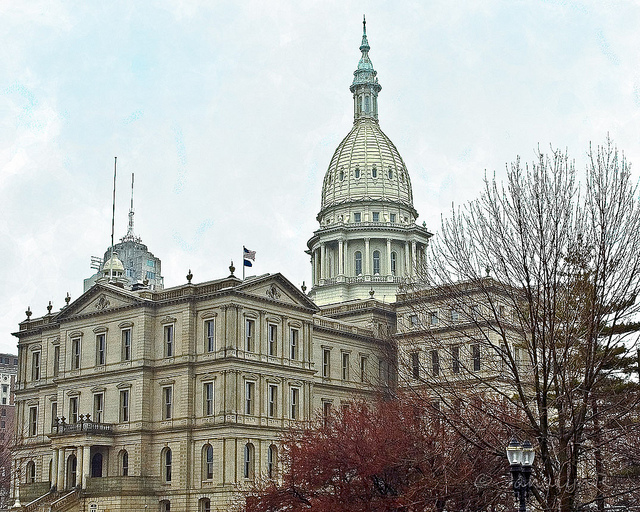Last week, Michigan’s legislature passed into law a 7.3 cent per gallon fuel tax increase becoming the 8th state in 2016 to increase investment in its transportation infrastructure. Today Governor Rick Snyder (R) signed this bill into law outside of the Michigan Infrastructure and Transportation Association headquarters.
Today’s bill signing is at least one year in the making! Last fall, the legislature worked diligently to put together a package to increase road funding in advance of a projected harsh winter. Working long hours up to the last day of the 2014 session a committee of key legislators met with the Governor’s office to no avail. These negotiations were only able to yield a failed ballot measure in May of this year.
Nonetheless, the two chambers went back to work while Governor Snyder continued to tour the state championing leading us to this long awaited moment in time.
Michigan’s surface transportation currently has a backlog of needs due to decades of under investment. 22% of the state’s roads are in poor condition and 12% of the state’s bridges are structurally deficient. The state also made national news earlier this year because of its public transit system’s lack of service in Metro Detroit.
To address these needs, the new law will raise the gas tax to 26.3 cents per gallon starting January 1, 2017. The first increase the state has seen since 1997. The additional tax revenue is expected to generate nearly $600 million in new revenue. Additional funds will come from the 20% increase in vehicle registration, which themselves have not increased in 30 years, and additional fees for hybrid and electric vehicles.
Additional road funding will come from a shift in funds from the general fund beginning with a $150 million transfer in the 2018-19 budget reaching a maximum of $600 million by 2021. When fully implemented it is expected the package will generate $1.2 billion.
The tax increase and higher fees are expected to be offset by a yearly reduction in personal income taxes beginning in 2023 and property tax credits.
While the net effect of today’s bill signing is still a few years in the making, Michigan is off to a good start. Increased investment means safer roads and bridges for commuters and the potential for economic growth as businesses can more readily get their goods to market. We applaud Michigan’s legislative body and the Governor have who have helped chart a course toward better and safer future.
